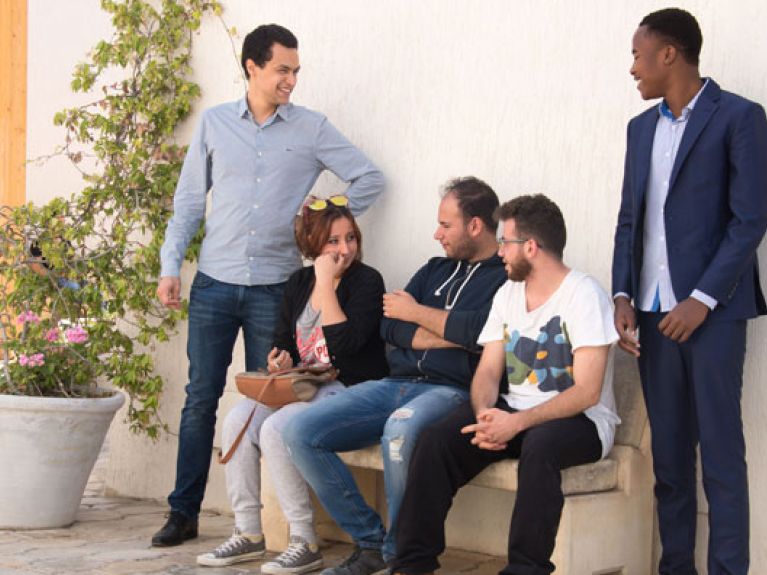Making a fresh start in Tunisia
A German-Tunisian advice centre in Tunis aims to integrate returnees from Europe and improve the job prospects of young Tunisians.

Zied Ouled Ali came to Germany after completing his university entrance exams, when he studied engineering in Karlsruhe. After ten years he felt the urge to return to Tunisia. “I’ve always wanted to set up my own business, and the opportunities here are better, especially after the revolution.” The young man dressed in a suit and tie is the perfect example of a successful returnee: he speaks four languages and is highly qualified and ambitious. He has founded an IT start-up in Tunis with support from a programme run by the Deutsche Gesellschaft für Internationale Zusammenarbeit (GIZ). “The foundation grant made the decision easier.” In Germany he could earn more than he does here, he says, but he has set his heart on having his own firm. He already has three employees and plans to hire four more by the end of 2017. He is currently also negotiating with a foreign investor.
Different mentalities
Speaking at the new German-Tunisian advice centre, Ouled Ali reports on his first steps as an entrepreneur, on the initial difficulties and the differences in mentality between the two countries. The Centre for Jobs, Migration and Reintegration, as it is known in full, is located in premises belonging to the Tunisian employment agency – a shop in the very centre of Tunis. Large numbers of brochures are on display. Some of them also provide information about the German labour market, because the centre is intended not only to inform people about the risks of illegal migration, but also about legal routes to Germany, says Director Oula Tarssim. The centre has two target groups. First, young Tunisians who feel they have no prospects in their homeland and are thinking about leaving. Among other things, the centre is meant to draw their attention to training opportunities in Tunisia. Second, it aims to offer returnees opportunities to make a fresh start.
It is estimated that 450 Tunisians are currently living in Germany without resident permits, while another 1,000 have temporary leave to remain, but have not been recognised as refugees. Sooner or later they will have to return to their native country. “We must reintegrate them in Tunisia so that they do not return as losers,” said Gerd Müller, Federal Minister for Economic Cooperation and Development, at the opening of the centre in March 2017. The ministry’s returnee programme received additional funding of roughly 13 million euros for that purpose. Financial support and the prospect of advice in Tunisia are meant to encourage those concerned to return to their home country voluntarily.
High unemployment
However, finding a place for them on the Tunisian labour market is likely to be difficult. Most of them are not highly qualified graduates like Zied Ouled Ali. And jobs have been in short supply in Tunisia for a long time: officially, the unemployment rate is 15.5%, but the real rate is probably higher. Many university graduates do not find work. The economic growth forecast for 2017 is an optimistic 2.5%, which would be significantly higher than in the recent past.
Nevertheless, it is important to correct Tunisia’s image in Germany, says Development Minister Müller. “The country is experiencing an upturn. It is stable and has democratic structures.” Exchanging experiences between new returnees and “old ones” like him is important to ensure that the returnees also benefit from what has so far only been a small upturn, says Ouled Ali. His experience of self-employment has confirmed his view that there is a solution to every problem. “You only have to look around a little.”

